formerly eScholarship Editions


|
|
|
|
Your search for
Public
in rights
'Philosophy' in subject
found 56 book(s). | Modify Search | Displaying 41 - 56 of 56 book(s) | |
| 41. |  | Title: Abuses Author: Lingis, Alphonso 1933- Published: University of California Press, 1994 Subjects: Philosophy | Literature | Cultural Anthropology | Social and Political Thought | Psychology | Travel Publisher's Description: Part travelogue, part meditation, Abuses is a bold exploration of central themes in Continental philosophy by one of the most passionate and original thinkers in that tradition writing today.A gripping record of desires, obsessions, bodies, and spaces experienced in distant lands, Alphonso Lingis's book offers no less than a new approach to philosophy - aesthetic and sympathetic - which departs from the phenomenology of Levinas and Merleau-Ponty. "These were letters written to friends," Lingis writes, "from places I found myself for months at a time, about encounters that moved me and troubled me. . . . These writings also became no longer my letters. I found myself only trying to speak for others, others greeted only with passionate kisses of parting."Ranging from the elevated Inca citadel of Machu Picchu, to the living rooms of the Mexican elite, to the streets of Manila, Lingis recounts incidents of state-sponsored violence and the progressive incorporation of third-world peoples into the circuits of exchange of international capitalism. Recalling the work of such writers as Graham Greene, Kathy Acker, and Georges Bataille, Abuses contains impassioned accounts of silence, eros and identity, torture and war, the sublime, lust and joy, and human rituals surrounding carnival and death that occurred during his journeys to India, Bangladesh, Thailand, Bali, the Philippines, Antarctica, and Latin America. A deeply unsettling book by a philosopher of unusual imagination, Abuses will appeal to readers who, like its author, "may want the enigmas and want the discomfiture within oneself." [brief] Similar Items |
| 42. | 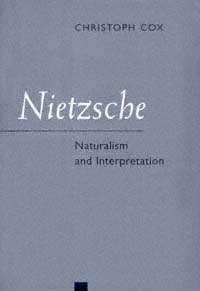 | Title: Nietzsche: naturalism and interpretation Author: Cox, Christoph 1965- Published: University of California Press, 1999 Subjects: Philosophy Publisher's Description: Nietzsche: Naturalism and Interpretation offers a resolution of one of the most vexing problems in Nietzsche scholarship. As perhaps the most significant predecessor of more recent attempts to formulate a postmetaphysical epistemology and ontology, Nietzsche is considered by many critics to share this problem with his successors: How can an antifoundationalist philosophy avoid vicious relativism and legitimate its claim to provide a platform for the critique of arguments, practices, and institutions?Christoph Cox argues that Nietzsche successfully navigates between relativism and dogmatism, accepting the naturalistic critique of metaphysics and theology provided by modern science, yet maintaining that a thoroughgoing naturalism must move beyond scientific reductionism. It must accept a central feature of aesthetic understanding: acknowledgment of the primacy and irreducibility of interpretation. This view of Nietzsche's doctrines of perspectivism, becoming, and will to power as products of an overall naturalism balanced by a reciprocal commitment to interpretationism will spur new discussions of epistemology and ontology in contemporary thought. [brief] Similar Items |
| 43. | 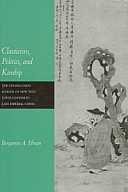 | Title: Classicism, politics, and kinship: the Chʿang-chou school of new text Confucianism in late imperial China Author: Elman, Benjamin A 1946- Published: University of California Press, 1990 Subjects: History | China | Philosophy Publisher's Description: Scholars have generally agreed that the story of New Text Confucianism in late imperial China centers on K'ang Yu-wei and the late nineteenth-century political reforms he took credit for after fleeing China in 1898. In this important new book, Benjamin Elman explores the roots of New Text ideas and shows that Confucians first dissented from the orthodox raison d'etre of the imperial state over three hundred years earlier, during the transition from the late Ming to early Ch'ing dynasties.New Text scholars, although not revolutionary, stood for new forms of belief, and they challenged the authenticity of classical sources upon which much orthodox political discourse had been based. Their notions of historical change proved to be important stepping stones toward an influential New Text vision of social and political transformation that climaxed in the 1898 reform movement.Elman examines the conflicting New Text versus Old Text portraits of Confucius in order to gain a more precise grasp of classical studies in imperial China as the ideological source for the "constitutionality" of the Confucian imperium. Central to his argument is the discovery that kinship organizations in pre-modern China played an important role in fostering schools of learning such as the Ch'ang-chou New Text school. Accordingly, this study affords us a unique perspective on how gentry sought to impose their agenda on the state in an effort to weather the great changes occurring during the Ming and Ch'ing dynasties. [brief] Similar Items |
| 44. | 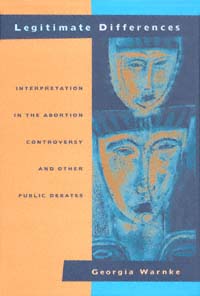 | Title: Legitimate differences: interpretation in the abortion controversy and other public debates Author: Warnke, Georgia Published: University of California Press, 1999 Subjects: Philosophy | Social and Political Thought | Gender Studies Publisher's Description: Legitimate Differences challenges the usual portrayal of current debates over thorny social issues including abortion, pornography, affirmative action, and surrogate mothering as moral debates. How can it be said that our debates oppose principles of life to those of liberty, principles of liberty to those of equality, principles of equality to those of fairness, and principles of fairness to those of integrity, when we as Americans share all these principles?Debates over such issues are not, Georgia Warnke argues, moral debates over which principles we should adopt. Rather, they are interpretive debates over the meanings of principles we already possess. Warnke traces the structure of these debates with reference to the work of Jane Austen, Hans-Georg Gadamer, Jürgen Habermas, and Bernard Williams. In separate chapters on surrogate mothering, affirmative action, abortion, and pornography she articulates new understandings of the meanings of some of our principles and shows the equal legitimacy of some different interpretations of the meanings of others. Finally, she suggests that the orientation of American public policy ought to be directed less at finding single canonical interpretations of our principles than at accommodating different legitimate understandings of them. The perspective offered by Legitimate Differences should have a significantly beneficial effect on public discussions. [brief] Similar Items |
| 45. | 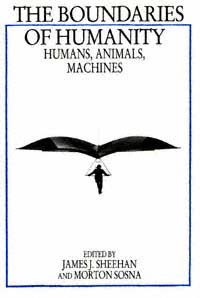 | Title: The Boundaries of humanity: humans, animals, machines Author: Sheehan, James J Published: University of California Press, 1991 Subjects: Philosophy | History and Philosophy of Science | Biology | Technology and Society Publisher's Description: To the age-old debate over what it means to be human, the relatively new fields of sociobiology and artificial intelligence bring new, if not necessarily compatible, insights. What have these two fields in common? Have they affected the way we define humanity? These and other timely questions are addressed with colorful individuality by the authors of The Boundaries of Humanity .Leading researchers in both sociobiology and artificial intelligence combine their reflections with those of philosophers, historians, and social scientists, while the editors explore the historical and contemporary contexts of the debate in their introductions. The implications of their individual arguments, and the often heated controversies generated by biological determinism or by mechanical models of mind, go to the heart of contemporary scientific, philosophical, and humanistic studies. [brief] Similar Items |
| 46. |  | Title: Representation and its discontents: the critical legacy of German romanticism Author: Seyhan, Azade Published: University of California Press, 1992 Subjects: Philosophy | Literary Theory and Criticism | German Studies Publisher's Description: Azade Seyhan provides a concise, elegantly argued introduction to the critical theory of German Romanticism and demonstrates how its approach to the metaphorical and linguistic nature of knowledge is very much alive in contemporary philosophy and literary theory. Her analysis of key thinkers such as Friedrich Schlegel and Novalis explores their views on rhetoric, systematicity, hermeneutics, and cultural interpretation. Seyhan examines German Romanticism as a critical intervention in the debates on representation, which developed in response to the philosophical revolution of German Idealism.Facing a chaotic political and intellectual landscape, the eighteenth-century theorists sought new models of understanding and new objectives for criticism and philosophy. Representation and Its Discontents identifies the legacy of this formative moment in modern criticism and suggests its relevance to contemporary discussions of post-structuralism, orientalism, theories of textuality, and the nature of philosophical discourse. [brief] Similar Items |
| 47. | 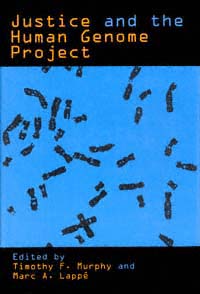 | Title: Justice and the human genome project Author: Murphy, Timothy F 1955- Published: University of California Press, 1994 Subjects: Philosophy | Ethics | Biology | Medicine Publisher's Description: The Human Genome Project is an expensive, ambitious, and controversial attempt to locate and map every one of the approximately 100,000 genes in the human body. If it works, and we are able, for instance, to identify markers for genetic diseases long before they develop, who will have the right to obtain such information? What will be the consequences for health care, health insurance, employability, and research priorities? And, more broadly, how will attitudes toward human differences be affected, morally and socially, by the setting of a genetic "standard"?The compatibility of individual rights and genetic fairness is challenged by the technological possibilities of the future, making it difficult to create an agenda for a "just genetics." Beginning with an account of the utopian dreams and authoritarian tendencies of historical eugenics movements, this book's nine essays probe the potential social uses and abuses of detailed genetic information. Lucid and wide-ranging, these contributions will provoke discussion among bioethicists, legal scholars, and policy makers. [brief] Similar Items |
| 48. | 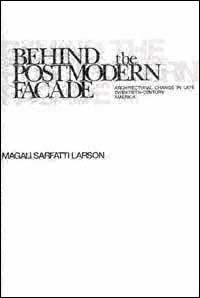 | Title: Behind the postmodern facade: architectural change in late twentieth-century America Author: Larson, Magali Sarfatti Published: University of California Press, 1993 Subjects: Architecture | Architecture | Philosophy | Politics | American Studies | Sociology | Social Theory Publisher's Description: Magali Larson's comprehensive study explores how architecture "happens" and what has become of the profession in the postmodern era. Drawing from extensive interviews with pivotal architects - from Philip Johnson, who was among the first to introduce European modernism to America, to Peter Eisenman, identified with a new "deconstructionist" style - she analyzes the complex tensions that exist between economic interest, professional status, and architectural product. She investigates the symbolic awards and recognition accorded by prestigious journals and panels, exposing the inner workings of a profession in a precarious social position. Larson captures the struggles around status, place, and power as architects seek to redefine their very purpose in contemporary America.The author's novel approach in synthesizing sociological research and theory proposes nothing less than a new cultural history of architecture. This is a ground-breaking contribution to the study of culture and the sociology of knowledge, as well as to architectural and urban history. [brief] Similar Items |
| 49. | 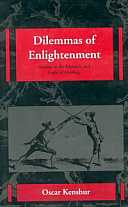 | Title: Dilemmas of enlightenment: studies in the rhetoric and logic of ideology Author: Kenshur, Oscar 1942- Published: University of California Press, 1993 Subjects: Philosophy | Social and Political Thought | Literary Theory and Criticism | European History Publisher's Description: Oscar Kenshur combines trenchant analyses of important early-modern texts with a powerful critique of postmodern theories of ideology. He thereby contributes both to our understanding of Enlightenment thought and to contemporary debates about cultural studies and critical theory.While striving to resolve "dilemmas" occasioned by conflicting intellectual and political commitments, seventeenth- and eighteenth-century writers often relied upon ideas originally used by their enemies to support very different claims. Thus, they engaged in what Kenshur calls "intellectual co-optation." In exploring the ways in which Dryden, Bayle, Voltaire, Johnson, and others used this technique, Kenshur presents a historical landscape distinctly different from the one constructed by much contemporary theory. [brief] Similar Items |
| 50. | 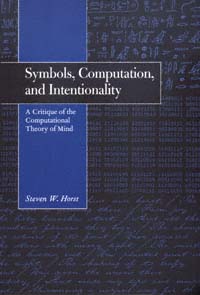 | Title: Symbols, computation, and intentionality: a critique of the computational theory of mind Author: Horst, Steven W 1960- Published: University of California Press, 1996 Subjects: Philosophy | Social and Political Thought | Psychology Publisher's Description: The computational theory of mind - the belief that the mind can be likened to a computer and that cognitive states possess the generative and compositional properties of natural languages - has proven enormously influential in recent philosophical studies of cognition. In this carefully argued critique, Steven Horst pronounces the theory deficient. He refutes its claims and assumptions, particularly the assertion that symbolic representations need not have conventional meaning. Horst goes on to sketch a new methodology for looking at the philosophy of psychology, one that provides a more fruitful way of comparing computational psychology with rival views emerging from connectionism and neuroscience. Original and comprehensive, his book is certain to provoke controversy and stimulate debate. [brief] Similar Items |
| 51. | 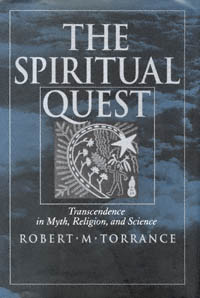 | Title: The spiritual quest: transcendence in myth, religion, and science Author: Torrance, Robert M. (Robert Mitchell) 1939- Published: University of California Press, 1994 Subjects: Religion | Indigenous Religions | Cultural Anthropology | Folklore and Mythology | Language and Linguistics | Philosophy | History and Philosophy of Science | Literature Publisher's Description: Robert Torrance's wide-ranging, innovative study argues that the spiritual quest is rooted in our biological, psychological, linguistic, and social nature. The quest is not, as most have believed, a rare mystical experience, but a frequent expression of our most basic human impulses. Shaman and scientist, medium and poet, prophet and philosopher, all venture forth in quest of visionary truths to transform and renew the world.Yet Torrance is not trying to reduce the quest to an "archetype" or "monomyth." Instead, he presents the full diversity of the quest in the myths and religious practices of tribal peoples throughout the world, from Oceania to India, Africa, Siberia, and especially the Americas. In theorizing about the quest, Torrance draws on thinkers as diverse as Bergson and Piaget, van Gennep and Turner, Pierce and Popper, Freud, Darwin, and Chomsky. This is a book that will expand our knowledge - and awareness - of a fundamental human activity in all its fascinating complexity. [brief] Similar Items |
| 52. | 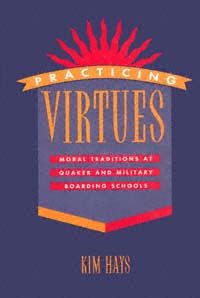 | Title: Practicing virtues: moral traditions at Quaker and military boarding schools Author: Hays, Kim Published: University of California Press, 1994 Subjects: Sociology | Philosophy | Education Publisher's Description: Practicing Virtues is about learning to be good in the distinct moral worlds of Quaker and military boarding schools. Both types of schools bind their communities with shared codes of conduct, the military schools' conservative tradition emphasizing discipline and hard work, the Quaker schools' liberal tradition favoring tolerance and togetherness. At the heart of this contrast are two sets of virtues: pride, loyalty, and leadership among the cadets; simplicity, equality, and concern among the students at Quaker schools.During the course of a year Kim Hays lived in six schools, attending classes and staff meetings, sharing meals and informal conversation, and participating in the nonacademic side of boarding-school life.Despite the outward contrast between the Quaker and military settings, Hays found surprising similarities. Both systems cherish individualism while encouraging group identification and service to the school community. Hays shows that orderliness, obedience, and harmony do not in themselves create a vital moral environment. To reach that goal, teachers, students, and administrators need to disagree, question rules, and fight for change.This book has much to say about the role of education in developing moral responsibility. Every educator, student, and parent who cares about the future of American schooling will find valuable lessons here. [brief] Similar Items |
| 53. | 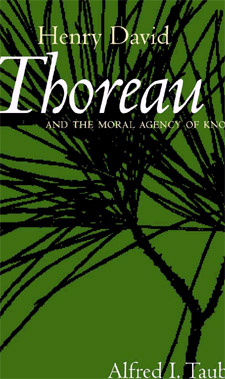 | Title: Henry David Thoreau and the moral agency of knowing Author: Tauber, Alfred I Published: University of California Press, 2001 Subjects: Philosophy | Literature | History and Philosophy of Science | Ethics Publisher's Description: In his graceful philosophical account, Alfred I. Tauber shows why Thoreau still seems so relevant today - more relevant in many respects than he seemed to his contemporaries. Although Thoreau has been skillfully and thoroughly examined as a writer, naturalist, mystic, historian, social thinker, Transcendentalist, and lifelong student, we may find in Tauber's portrait of Thoreau the moralist a characterization that binds all these aspects of his career together. Thoreau was caught at a critical turn in the history of science, between the ebb of Romanticism and the rising tide of positivism. He responded to the challenges posed by the new ideal of objectivity not by rejecting the scientific worldview, but by humanizing it for himself. Tauber portrays Thoreau as a man whose moral vision guided his life's work. Each of Thoreau's projects reflected a self-proclaimed "metaphysical ethics," an articulated program of self-discovery and self-knowing. By writing, by combining precision with poetry in his naturalist pursuits and simplicity with mystical fervor in his daily activity, Thoreau sought to live a life of virtue - one he would characterize as marked by deliberate choice. This unique vision of human agency and responsibility will still seem fresh and contemporary to readers at the start of the twenty-first century. [brief] Similar Items |
| 54. |  | Title: Foregone conclusions: against apocalyptic history Author: Bernstein, Michael André 1947- Published: University of California Press, 1994 Subjects: Philosophy | Jewish Studies | Literature | Literary Theory and Criticism Publisher's Description: Michael André Bernstein's passionate denunciation of apocalyptic thinking provides a moral, philosophical, and literary challenge to the way most of us make sense of our worlds. In our search for coherence, Bernstein argues, we tend to see our lives as moving toward a predetermined fate. This "foreshadowing" demeans the variety, the richness, and especially the unpredictability of everyday life. Apocalyptic history denies the openness and choice available to its actors.Bernstein chooses the Holocaust as the prime example of our tendency toward foregone conclusions. He argues eloquently against politicians and theologians who depict the Holocaust as foreordained and its victims as somehow implicated in a fate they should have been able to foresee. But his argument ranges wider. From recent biographies of Kafka to the Israeli-P.L.O. peace accords, from campus cultural diversity debates to the Crown Heights riots, Bernstein warns against our passive acceptance of historical or personal victimization.An essential contribution to Holocaust studies, this book is also a lucid call to transform the way we read and write history and the way we make sense of our lives. [brief] Similar Items |
| 55. | 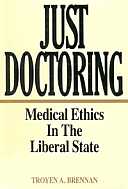 | Title: Just doctoring: medical ethics in the liberal state Author: Brennan, Troyen A Published: University of California Press, 1991 Subjects: Philosophy | Ethics | Medicine Publisher's Description: Just Doctoring draws the doctor-patient relationship out of the consulting room and into the middle of the legal and political arenas where it more and more frequently appears. Traditionally, medical ethics has focused on the isolated relationship of physician to patient in a setting that has left the physician virtually untouched by market constraints or government regulation. Arguing that changes in health care institutions and legal attention to patient rights have made conventional approaches obsolete, Troyen Brennan points the way to a new, more aware and engaged medical ethics.The medical profession is no longer isolated, even theoretically, from the liberal, market-dominated state. Old ideas of physician beneficence and altruism must make way for a justice-based medical ethics, assuming a relationship between equals more compatible with liberal political philosophy. Brennan offers clinical examples of many of today's most challenging medical problems - from informed consent to care rationing and the repercussions of the HIV epidemic - and gives his recommendation for a new ethical perspective. This lively and controversial plea for a rethinking of medical ethics goes right to the heart of medical care at the end of the twentieth century. [brief] Similar Items |
| 56. | 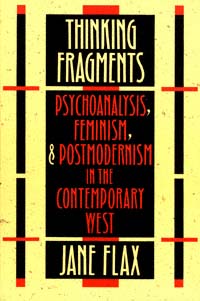 | Title: Thinking fragments: psychoanalysis, feminism, and postmodernism in the contemporary West Author: Flax, Jane Published: University of California Press, 1990 Subjects: Gender Studies | Psychiatry | Political Theory | Literary Theory and Criticism Publisher's Description: Thinking Fragments provides a brilliant critique of psychoanalytic, feminist, and postmodern theory. Examining the writings of Freud, Winnicott, Lacan, Chodorow, Irigaray, Derrida, Rorty, and Foucault, among others, Flax conducts a "conversation" among psychoanalysts, feminist thinkers, and postmodern theorists, evaluating the ways in which each group of thinkers succeeds in coming to terms with crises in contemporary Western culture. As she analyzes each theory in turn, the others are used to identify and interrogate its gaps and omissions. The result is a postmodern text of intertwined ideas, devoid of clear beginnings, endings, conclusions.Flax addresses the question, "how is it possible to theorize in the contemporary West?" With the demise of objective notions of truth, knowledge, self and power, intellectuals have devised these new modes of thinking which both reflect and contribute to the uncertainties of the contemporary West. Each also addresses at least one aspect of what has become most problematic to modern individuals: How to come to terms with self, gender, knowledge and power without resorting to concepts that stress objectivity, universal knowledge, and a unitary self.Flax finds that neither psychoanalysis, nor feminism, nor postmodernism is adequate to the task for which it was conceived. Each can illuminate certain aspects of problems of self, gender, knowledge, and power, but none is sufficient on its own. In fact, each incorporates characteristic blindnesses rooted in part in the very difficulties it addresses. Despite their failures, Flax concludes that these modes of theorizing are our best tools thus far, compelling us to use them even while we grapple with the problems they raise. Thinking Fragments is a wide-ranging study that will elicit much discussion and debate. It is an essential text for social scientists and humanists alike, as well as anyone else who thinks about how to "do" theory in the contemporary West. [brief] Similar Items |